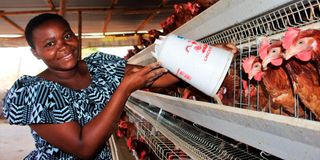Breaking News: KDF chopper crash kills five in West Pokot
Are you interested in chicken farming?

Anna Ndunda feeds chicken at Kambi Ya Mawe Village in Makueni County on October 29, 2022. The county administrator has made a fortune from the production of eggs.
Incessant cackling of chicken welcomes visitors to Anna Ndunda's homestead on the fringes of Wote Town in Makueni County. The administrator, who works for the county government, is among tens of farmers in the area who keep chicken for egg production.
We find a worker feeding the birds housed in a coop behind the main house when we arrive at Anna’s homestead in Kambi ya Mawe Village.
“The birds are hungry, but they are also anxious. Strangers agitate them,” she explains the cackling.
“We keenly monitor their noise and act accordingly. Failing to properly decode and act on a signal may reduce their productivity,” she further explains.
A tour of the farm reveals an elaborate battery cage system. The work, explains the businesswoman, who trades as Poultry Queen Enterprise, starts with sourcing chicks from certified dealers. She buys day-old chicks from a supplier in Nairobi and puts them in a brooder powered by specially designed pots which run on charcoal. The chicks are also put on a vaccination regimen against common diseases.
“We stock Issa Brown, a hybrid chicken famed for its egg laying. We transfer the chicks from the brooder to the cages when they are three months old. They start hatching when they are 18-20 weeks old and don't stop until they are 18 months old,” she says.
Battery cage system
Although it is at the centre of debate on the welfare of chickens, the battery cage system ensures that a farmer collects clean eggs.
“The cage system enables us to monitor the health and productivity of individual birds. This prompts appropriate action such as the isolation of a sick bird. More importantly, the battery cage system enhances efficiency in feed and water use by reducing wastage,” Anna says.
The administrator’s chicken enterprise stands out in a region known for tropical fruit farming. As Wote, a once sleepy township, roars to life thanks to the billions of shillings being pumped into the devolved unit by the national government, donors and investors in the wake of devolution, intensive farming has crept in around the vibrant town where dozens of palatial homes have eaten into farmlands, inviting entrepreneurs to grab emerging opportunities.

Anna Ndunda with her chicken at Kambi Ya Mawe Village in Makueni County on October 29, 2022.
Anna traces her interest in chicken rearing to her upbringing in the countryside. A hen her grandfather gifted her when she was in Standard Two seeded a small chicken venture which was managed by her mother. She recalled how her mother would sell part of the flock to buy her clothes and shoes. An aunt also traded in chicken. As a teenager, Anna ran errands for this aunt who would buy kienyeji chicken from farmers in the countryside and take them to a market in Mombasa.
"In addition to being a key pillar in the livelihoods of many smallholder chicken farmers in the countryside, I admired how my aunt supported her family through her chicken business,” Anna says.
“Initially, we kept chicken for meat and eggs under the deep litter system in a small scale venture which struggled to carry its weight as it was less profitable.”
It took a visit to President William Ruto's farm to turn around the enterprise. She was among a lean team of chicken farmers from Makueni County who visited the President's farm at Sugoi in Uasin Gishu County for benchmarking purposes last year.
"Here, I learned about the cage system and the importance of clean water and high-quality feeds in chicken production. I also learned about the gradual introduction of growers' mash to chicks,” she explains.
With 1, 500 layers, Anna is among the biggest chicken farmers in the county. She collects 43 trays of eggs daily. Wholesalers buy the eggs from her farm, which they sell in Wote Township to individuals, restaurants and hotels. Her customers cite the size and cleanliness of the eggs, attributes Anna associates with the battery cage system. In spite of her output, Anna’s 43 trays of eggs a day are nowhere near enough to meet the demand for eggs in this area, meaning it is a viable business to invest in.
Challenges
In a semi-arid region known for drought and crop failure, Anna cites water and feed as her biggest challenges. She spends Sh11, 000 daily on commercial feeds and Sh10, 000 to buy water every month. According to Nicholas Muyale, the chairman of the Kenya Veterinary Association, feeds take up 70 per cent of the cost of producing eggs in Kenya. This makes Kenyan eggs uncompetitive in the market compared to eggs imported from Uganda.
“The cost of producing an egg is hinged on feed. 70 per cent of the inputs on egg production is on feed. Uganda produces the raw materials for making feeds and does farm feed formulations. In Kenya, we do commercial feed formulation, and because we import most of the raw materials, the production cost is high,” he said during this year's World Eggs Day.
He advises poultry farmers to embrace new technologies of feed production such as the use of Black Soldier Fly maggots to cut on the cost of producing feed and make the egg production ventures profitable.
Anna plans to expand her stock to 10,000 birds. The youthful farmer also plans to carve out an extra revenue stream from the birds by setting up a model farm and opening it for training on poultry farming and egg production.





